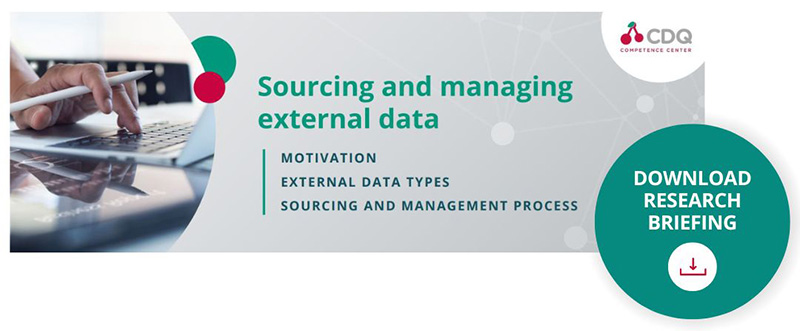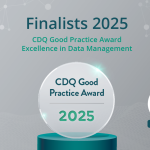Unleashing the power of external data - smartly and efficiently

After reading this article, you will better understand the benefits of using external data sources for your organization's data management, comprehend challenges when managing and sourcing external data, and know a shortcut to benefit smartly and efficiently from external data sources.
What are the benefits of using external data sources?
In today's data-driven business environment, organizations are increasingly relying on diverse data sources to optimize their processes and enhance decision-making. Combining internally available data with data from external sources such as open data from public registries increases data quality in several ways. Here are four key benefits of using external data sources in business partner data management:
- Improved Data Accuracy: External data sources offer a wealth of information that might not be available within your organization. By leveraging this information, organizations can improve the accuracy and completeness of their business partner data.
- Time-Saving: With the help of external data sources, organizations can quickly and easily gather information about potential business partners. This can be particularly helpful when many data records are constantly created and maintained, or large volumes of data records need to be processed in time-critical scenarios like M&A activities.
- Risk Management: External data sources can provide important information for risk management purposes. By checking for regulatory compliance with sanction and watch lists, verifying the creditworthiness of a business partner, or identifying potential conflicts of interest, organizations can better manage risk and protect their assets.
- Improved Decision-Making: By having access to more complete and accurate data, organizations can make better decisions about which business partners to work with, how to manage those relationships, and how to allocate resources effectively. This can help organizations optimize their business partner strategy and achieve their business goals.
Why is managing and sourcing external data challenging?
However, managing and sourcing external data sources can be challenging for several reasons. Here are five key challenges to consider:
- External Data Source Integration: External data sources provide information in various structures and formats, making their integration a challenge - especially as these formats may change over time. Thus, organizations must be able to effectively manage and monitor the interfaces to external data sources for achieving maximum benefits.
- Varying Data Quality: External data sources may not always provide high-quality data; the data provided can be outdated, incomplete, or incorrect. Thus, these external data must be carefully checked (against predefined business rules) and also compared or merged with data from other sources.
- Data Volume: External data sources can generate large volumes of data, making it challenging to manage and process manually. Thus, companies need to find ways to efficiently manage these large volumes.
- Data Cost: In the case of paid external data sources, consuming external data come at a cost. Thus, companies must balance the use of freely available external data sources and (premium) paid data sources.
- Data Availability: External data sources may not always be available; for example, downtimes of public registry interfaces are common. Consequently, organizations must have backup plans to stage relevant data or otherwise ensure data availability.
Is there any shortcut to unleash the power of external data?
Yes!
Christine Legner and Pavel Krasikov from the research team of the Competence Center Corporate Data Quality (CC CDQ) and Markus Eurich from the CDQ consulting team explored how various multinational organizations manage and source external data. They recommend a standardized approach to data sourcing - instead of using external data ad-hoc - and suggest six steps for sourcing and managing external data: 1) request, 2) screen, 3) assess, 4) integrate, 5) manage and use, 6) retire.

The power of data sharing
While a 6-step process may be beneficial for managing a wide range of different external data sources, it may be over-engineered and too resource-intensive for a narrow set of comparable data sources. This is where the concept of data sharing becomes relevant.
By sharing external data sources in a community, organizations can streamline their data management processes and optimize their use of resources. Rather than setting up and following a complex process for data source on their own, organizations can leverage a shared pool of data sources and collaborate with others, allowing them to benefit from the community's expertise and to focus their efforts on data usage (like streamlined operations and informed decision-making), ultimately driving greater business success.
A proven example of data sharing is the CDQ Suite, which supports organizations in managing their customer and vendor master data in a smart and efficient way. In his recent article "Mastering Business Partners in SAP", Kai Hüner (Co-founder and CTO at CDQ) demonstrates the power of data sharing with the example of creating customer and vendor records faster, more efficiently, and "first time right". The creation workflow of SAP's Master Data Governance cloud edition requires just two manual entries (i.e., company name and country) - all further company details are automatically enriched from more than 70 trusted external data sources and quality-checked based on more than 2'100 data quality rules.
Recommended readings:
- Sourcing and Managing External Data (CC CDQ, 2023)
- Unleashing the Potential of External Data, a DSR-based Approach to Data Sourcing (Krasikov, P., Eurich, M., & Legner, C., 2022)
- Sourcing the Right Open Data: A Design Science Research Approach for the Enterprise Context. (Krasikov, P., Legner, C., & Eurich, M., 2021)
- Open Data in the Enterprise Context: Assessing Open Corporate Data’s Readiness for Use (Krasikov, P., Obrecht, T., Legner, C., & Eurich, M., 2020)
Get our e-mail!
Related blogs
Stepping out of silo thinking: Henkel’s data quality story
A refreshing look at how Henkel tackles an immensely complex data landscape: candid disussion with master data experts, Sandra Feisel and Stefanie Kreft.
The e-invoicing reality: the gateway is ready, but is your data?
Over the past decade, the EU has steadily shifted from encouraging electronic invoices to mandating them. And while the technology obviously plays an important…
How Henkel is turning master data quality into a service
Every now and then, you come across a project that makes you stop and think: “Now that’s how it should be done!” That’s exactly the case with Henkel and their…






